The Cambridge History of Japan, Vol. 4: Early Modern Japan
Подождите немного. Документ загружается.

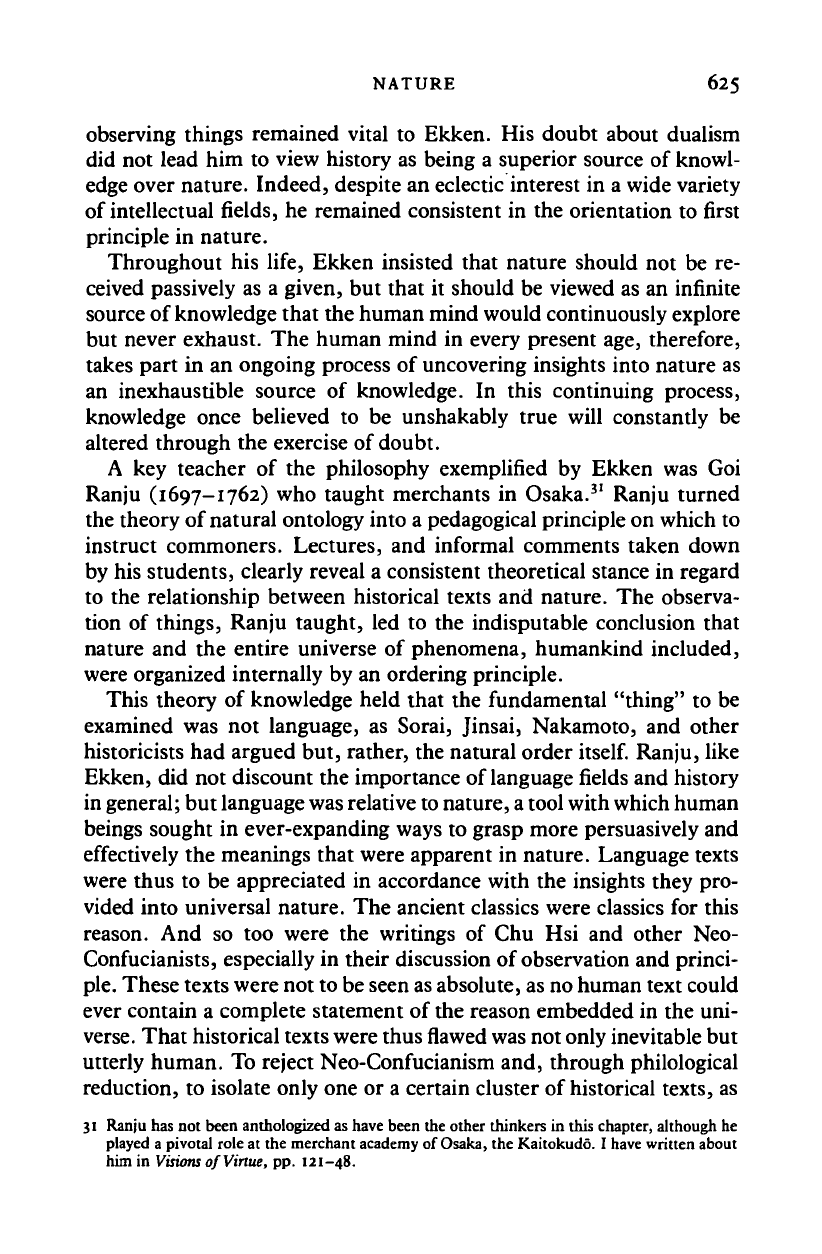
NATURE 625
observing things remained vital to Ekken. His doubt about dualism
did not lead him to view history as being a superior source of knowl-
edge over nature. Indeed, despite an eclectic interest in a wide variety
of intellectual fields, he remained consistent in the orientation to first
principle in nature.
Throughout his life, Ekken insisted that nature should not be re-
ceived passively as a given, but that it should be viewed as an infinite
source of knowledge that the human mind would continuously explore
but never exhaust. The human mind in every present age, therefore,
takes part in an ongoing process of uncovering insights into nature as
an inexhaustible source of knowledge. In this continuing process,
knowledge once believed to be unshakably true will constantly be
altered through the exercise of doubt.
A key teacher of the philosophy exemplified by Ekken was Goi
Ranju (1697-1762) who taught merchants in Osaka.
31
Ranju turned
the theory of natural ontology into a pedagogical principle on which to
instruct commoners. Lectures, and informal comments taken down
by his students, clearly reveal a consistent theoretical stance in regard
to the relationship between historical texts and nature. The observa-
tion of things, Ranju taught, led to the indisputable conclusion that
nature and the entire universe of phenomena, humankind included,
were organized internally by an ordering principle.
This theory of knowledge held that the fundamental "thing" to be
examined was not language, as Sorai, Jinsai, Nakamoto, and other
historicists had argued but, rather, the natural order
itself.
Ranju, like
Ekken, did not discount the importance of language fields and history
in
general;
but language
was
relative
to
nature,
a
tool with which human
beings sought in ever-expanding ways to grasp more persuasively and
effectively the meanings that were apparent in nature. Language texts
were thus to be appreciated in accordance with the insights they pro-
vided into universal nature. The ancient classics were classics for this
reason. And so too were the writings of Chu Hsi and other Neo-
Confucianists, especially in their discussion of observation and princi-
ple.
These texts were not to be seen
as
absolute, as no human text could
ever contain a complete statement of the reason embedded in the uni-
verse. That historical texts were thus
flawed
was not only inevitable but
utterly human. To reject Neo-Confucianism and, through philological
reduction, to isolate only one or a certain cluster of historical texts, as
31 Ranju has not been anthologized as have been the other thinkers in this chapter, although he
played a pivotal role at the merchant academy of Osaka, the Kaitokudo. I have written about
him in
Visions
of
Virtue,
pp. 121-48.
Cambridge Histories Online © Cambridge University Press, 2008
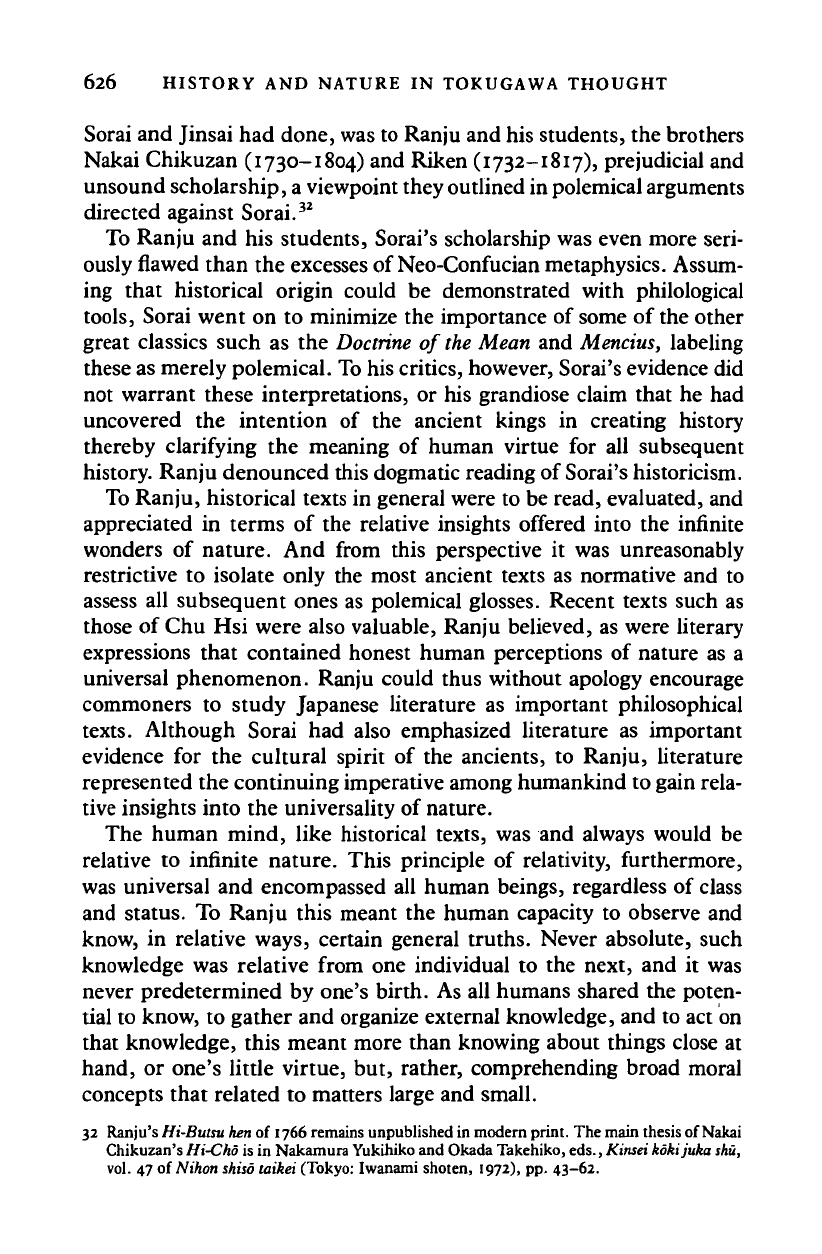
626 HISTORY AND NATURE IN TOKUGAWA THOUGHT
Sorai and Jinsai had done, was to Ranju and his students, the brothers
Nakai Chikuzan (1730-1804) and Riken (1732-1817), prejudicial and
unsound scholarship, a viewpoint they outlined in polemical arguments
directed against Sorai.
32
To Ranju and his students, Sorai's scholarship was even more seri-
ously flawed than the excesses of Neo-Confucian metaphysics. Assum-
ing that historical origin could be demonstrated with philological
tools,
Sorai went on to minimize the importance of some of the other
great classics such as the
Doctrine
of
the
Mean and
Mencius,
labeling
these as merely polemical. To his critics, however, Sorai's evidence did
not warrant these interpretations, or his grandiose claim that he had
uncovered the intention of the ancient kings in creating history
thereby clarifying the meaning of human virtue for all subsequent
history. Ranju denounced this dogmatic reading of Sorai's historicism.
To Ranju, historical texts in general were to be read, evaluated, and
appreciated in terms of the relative insights offered into the infinite
wonders of nature. And from this perspective it was unreasonably
restrictive to isolate only the most ancient texts as normative and to
assess all subsequent ones as polemical glosses. Recent texts such as
those of Chu Hsi were also valuable, Ranju believed, as were literary
expressions that contained honest human perceptions of nature as a
universal phenomenon. Ranju could thus without apology encourage
commoners to study Japanese literature as important philosophical
texts.
Although Sorai had also emphasized literature as important
evidence for the cultural spirit of the ancients, to Ranju, literature
represented the continuing imperative among humankind to gain rela-
tive insights into the universality of nature.
The human mind, like historical texts, was and always would be
relative to infinite nature. This principle of relativity, furthermore,
was universal and encompassed all human beings, regardless of class
and status. To Ranju this meant the human capacity to observe and
know, in relative ways, certain general truths. Never absolute, such
knowledge was relative from one individual to the next, and it was
never predetermined by one's birth. As all humans shared the poten-
tial to know, to gather and organize external knowledge, and to act on
that knowledge, this meant more than knowing about things close at
hand, or one's little virtue, but, rather, comprehending broad moral
concepts that related to matters large and small.
32 Ranju's
Hi-Butsu hen
of 1766 remains unpublished in modern print. The main thesis of Nakai
Chikuzan's
Hi-Cho
is in Nakamura Yukihiko and Okada Takehiko, eds.,
Kinsei kokijuka
shu,
vol.
47 oiNihon
shiso taikei
(Tokyo:
Iwanami shoten, 1972), pp. 43-62.
Cambridge Histories Online © Cambridge University Press, 2008
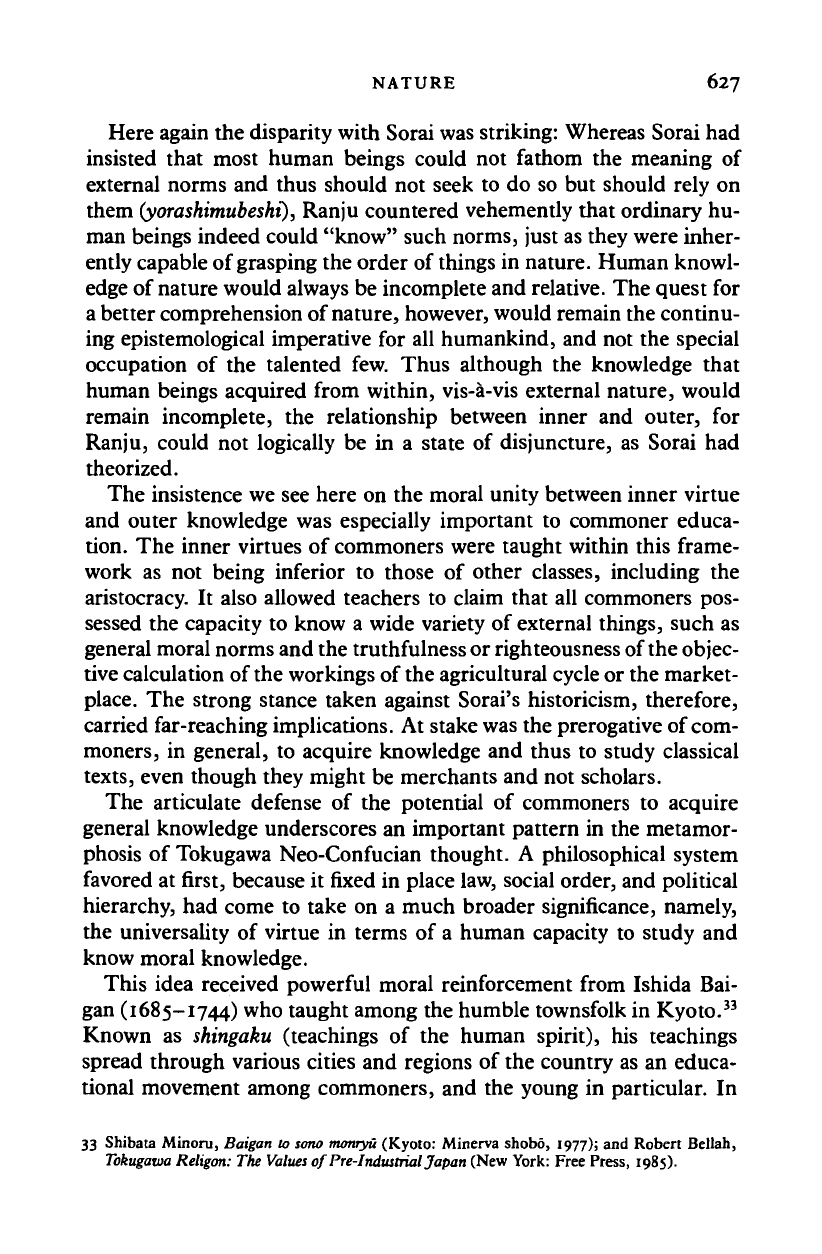
NATURE 627
Here again the disparity with Sorai was striking: Whereas Sorai had
insisted that most human beings could not fathom the meaning of
external norms and thus should not seek to do so but should rely on
them
(yorashimubeshi),
Ranju countered vehemently that ordinary hu-
man beings indeed could "know" such norms, just as they were inher-
ently capable of grasping the order of things in nature. Human knowl-
edge of nature would always be incomplete and relative. The quest for
a better comprehension of nature, however, would remain the continu-
ing epistemological imperative for all humankind, and not the special
occupation of the talented few. Thus although the knowledge that
human beings acquired from within, vis-a-vis external nature, would
remain incomplete, the relationship between inner and outer, for
Ranju, could not logically be in a state of disjuncture, as Sorai had
theorized.
The insistence we see here on the moral unity between inner virtue
and outer knowledge was especially important to commoner educa-
tion. The inner virtues of commoners were taught within this frame-
work as not being inferior to those of other classes, including the
aristocracy. It also allowed teachers to claim that all commoners pos-
sessed the capacity to know a wide variety of external things, such as
general moral norms and the truthfulness or righteousness of the objec-
tive calculation of
the
workings of the agricultural cycle or the market-
place. The strong stance taken against Sorai's historicism, therefore,
carried far-reaching implications. At stake was the prerogative of com-
moners, in general, to acquire knowledge and thus to study classical
texts,
even though they might be merchants and not scholars.
The articulate defense of the potential of commoners to acquire
general knowledge underscores an important pattern in the metamor-
phosis of Tokugawa Neo-Confucian thought. A philosophical system
favored at first, because it fixed in place law, social order, and political
hierarchy, had come to take on a much broader significance, namely,
the universality of virtue in terms of a human capacity to study and
know moral knowledge.
This idea received powerful moral reinforcement from Ishida Bai-
gan (1685-1744) who taught among the humble townsfolk in Kyoto.
33
Known as shingaku (teachings of the human spirit), his teachings
spread through various cities and regions of the country as an educa-
tional movement among commoners, and the young in particular. In
33 Shibata Minoru, Baigan to sono
monryu
(Kyoto: Minerva shobo, 1977); and Robert Bellah,
Tokugawa
Religon: The
Values
of Pre-Industrial Japan (New York: Free Press, 1985).
Cambridge Histories Online © Cambridge University Press, 2008
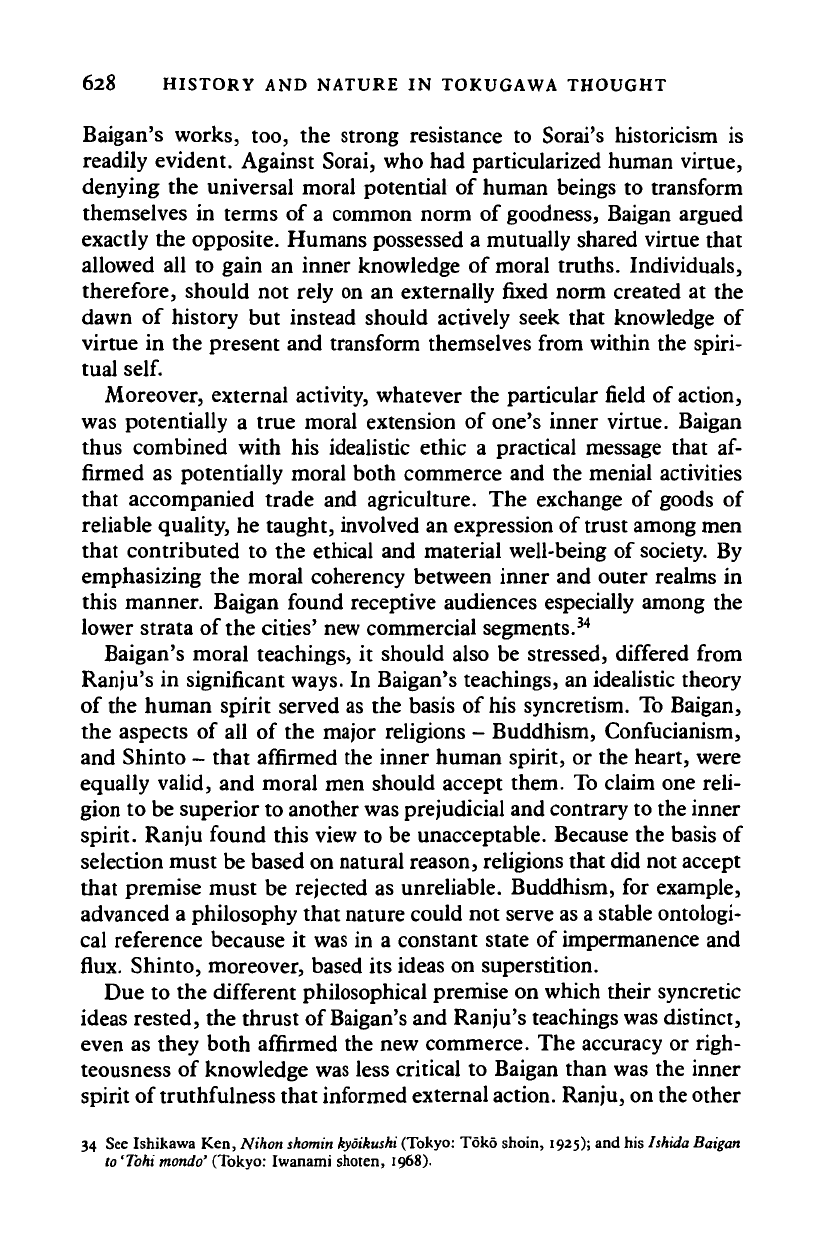
628 HISTORY AND NATURE IN TOKUGAWA THOUGHT
Baigan's works, too, the strong resistance to Sorai's historicism is
readily evident. Against Sorai, who had particularized human virtue,
denying the universal moral potential of human beings to transform
themselves in terms of a common norm of goodness, Baigan argued
exactly the opposite. Humans possessed a mutually shared virtue that
allowed all to gain an inner knowledge of moral truths. Individuals,
therefore, should not rely on an externally fixed norm created at the
dawn of history but instead should actively seek that knowledge of
virtue in the present and transform themselves from within the spiri-
tual
self.
Moreover, external activity, whatever the particular field of action,
was potentially a true moral extension of one's inner virtue. Baigan
thus combined with his idealistic ethic a practical message that af-
firmed as potentially moral both commerce and the menial activities
that accompanied trade and agriculture. The exchange of goods of
reliable quality, he taught, involved an expression of trust among men
that contributed to the ethical and material well-being of society. By
emphasizing the moral coherency between inner and outer realms in
this manner. Baigan found receptive audiences especially among the
lower strata of the cities' new commercial segments.
34
Baigan's moral teachings, it should also be stressed, differed from
Ranju's in significant ways. In Baigan's teachings, an idealistic theory
of the human spirit served as the basis of his syncretism. To Baigan,
the aspects of all of the major religions - Buddhism, Confucianism,
and Shinto - that affirmed the inner human spirit, or the heart, were
equally valid, and moral men should accept them. To claim one reli-
gion to be superior to another was prejudicial and contrary to the inner
spirit. Ranju found this view to be unacceptable. Because the basis of
selection must be based on natural reason, religions that did not accept
that premise must be rejected as unreliable. Buddhism, for example,
advanced a philosophy that nature could not serve as a stable ontologi-
cal reference because it was in a constant state of impermanence and
flux. Shinto, moreover, based its ideas on superstition.
Due to the different philosophical premise on which their syncretic
ideas rested, the thrust of Baigan's and Ranju's teachings was distinct,
even as they both affirmed the new commerce. The accuracy or righ-
teousness of knowledge was less critical to Baigan than was the inner
spirit of truthfulness that informed external action. Ranju, on the other
34 See Ishikawa Ken, Nihon shotnin kyoikushi (Tokyo: Toko shoin, 1925); and his Ishida Baigan
to 'Tohi mondo' (Tokyo: Iwanami shoten, 1968).
Cambridge Histories Online © Cambridge University Press, 2008
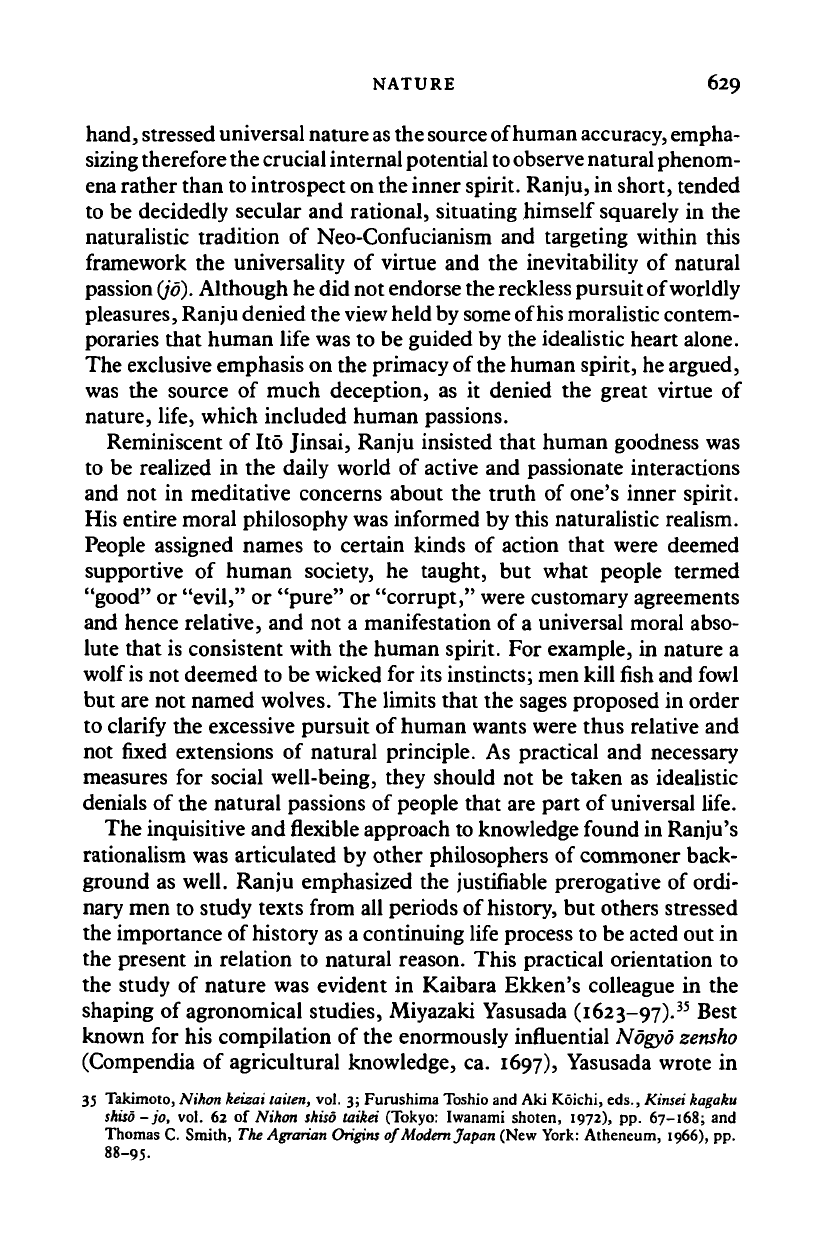
NATURE 629
hand, stressed universal nature
as
the source of human
accuracy,
empha-
sizing therefore the crucial internal potential to observe natural phenom-
ena rather than to introspect on the inner spirit. Ranju, in short, tended
to be decidedly secular and rational, situating himself squarely in the
naturalistic tradition of Neo-Confucianism and targeting within this
framework the universality of virtue and the inevitability of natural
passion
(jo).
Although he did not endorse
the
reckless pursuit of worldly
pleasures, Ranju denied the
view
held by
some
of
his
moralistic contem-
poraries that human life was to be guided by the idealistic heart alone.
The exclusive emphasis on the primacy of the human spirit, he argued,
was the source of much deception, as it denied the great virtue of
nature, life, which included human passions.
Reminiscent of Ito Jinsai, Ranju insisted that human goodness was
to be realized in the daily world of active and passionate interactions
and not in meditative concerns about the truth of one's inner spirit.
His entire moral philosophy was informed by this naturalistic realism.
People assigned names to certain kinds of action that were deemed
supportive of human society, he taught, but what people termed
"good" or "evil," or "pure" or "corrupt," were customary agreements
and hence relative, and not a manifestation of
a
universal moral abso-
lute that is consistent with the human spirit. For example, in nature a
wolf is not deemed to be wicked for its instincts; men kill fish and fowl
but are not named wolves. The limits that the sages proposed in order
to clarify the excessive pursuit of human wants were thus relative and
not fixed extensions of natural principle. As practical and necessary
measures for social well-being, they should not be taken as idealistic
denials of the natural passions of people that are part of universal life.
The inquisitive and
flexible
approach to knowledge found in Ranju's
rationalism was articulated by other philosophers of commoner back-
ground as well. Ranju emphasized the justifiable prerogative of ordi-
nary men to study texts from all periods of history, but others stressed
the importance of history as a continuing life process to be acted out in
the present in relation to natural reason. This practical orientation to
the study of nature was evident in Kaibara Ekken's colleague in the
shaping of agronomical studies, Miyazaki Yasusada (1623-97).
35
Best
known for his compilation of the enormously influential
Nogyo zensho
(Compendia of agricultural knowledge, ca. 1697), Yasusada wrote in
35 Takimoto, Nihon keizai taiten, vol. 3; Furushima Toshio and Aki Koichi, eds., Kinsei kagaku
shiso-jo, vol. 62 of Nihon shiso taikei (Tokyo: Iwanami shoten, 1972), pp. 67-168; and
Thomas C. Smith, The Agrarian Origins of
Modern
Japan (New York: Atheneum, 1966), pp.
88-95.
Cambridge Histories Online © Cambridge University Press, 2008
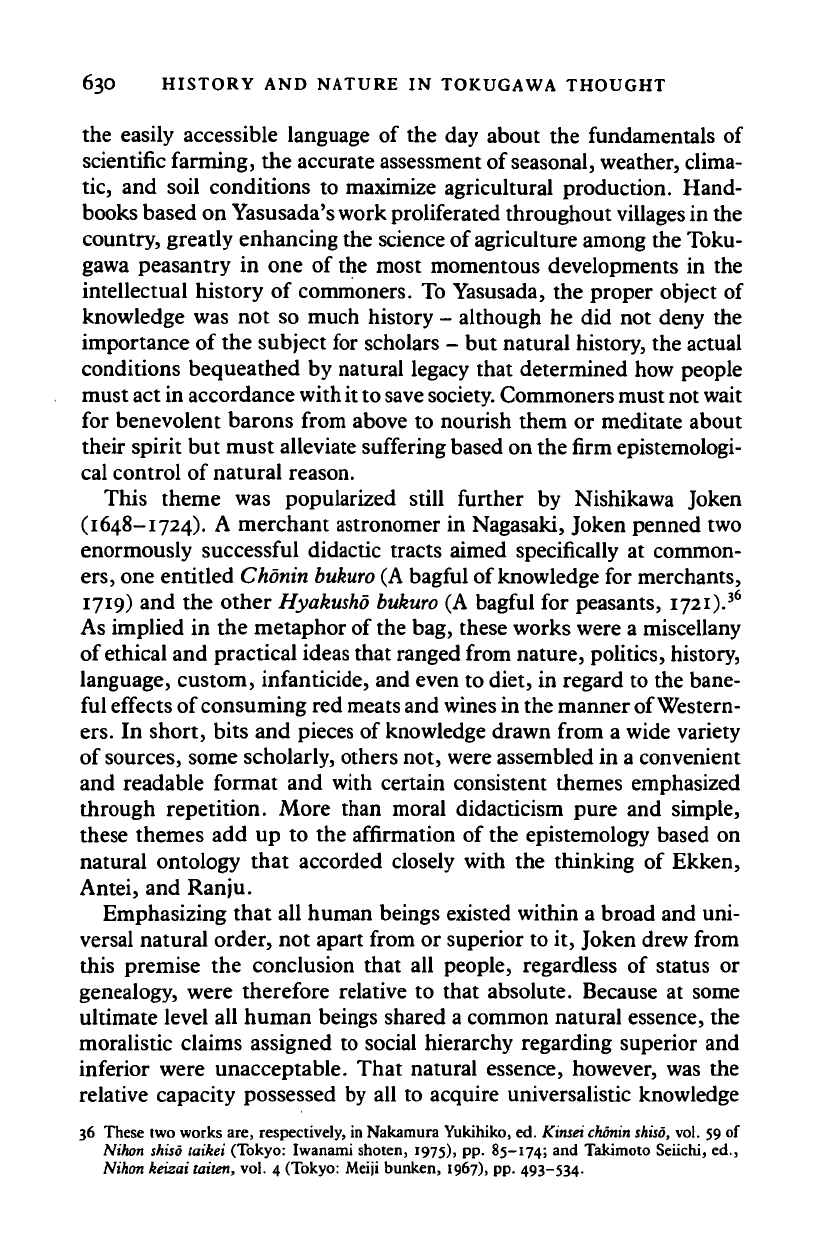
630 HISTORY AND NATURE IN TOKUGAWA THOUGHT
the easily accessible language of the day about the fundamentals of
scientific farming, the accurate assessment of
seasonal,
weather, clima-
tic,
and soil conditions to maximize agricultural production. Hand-
books based on Yasusada's work proliferated throughout villages in the
country, greatly enhancing the science of agriculture among the Toku-
gawa peasantry in one of the most momentous developments in the
intellectual history of commoners. To Yasusada, the proper object of
knowledge was not so much history - although he did not deny the
importance of the subject for scholars - but natural history, the actual
conditions bequeathed by natural legacy that determined how people
must act in accordance with it to
save
society.
Commoners must not wait
for benevolent barons from above to nourish them or meditate about
their spirit but must alleviate suffering based on the firm epistemologi-
cal control of natural reason.
This theme was popularized still further by Nishikawa Joken
(1648-1724). A merchant astronomer in Nagasaki, Joken penned two
enormously successful didactic tracts aimed specifically at common-
ers,
one entitled Chonin
bukuro
(A bagful of knowledge for merchants,
1719) and the other
Hyakushd bukuro
(A bagful for peasants, 1721).
36
As implied in the metaphor of the bag, these works were a miscellany
of ethical and practical ideas that ranged from nature, politics, history,
language, custom, infanticide, and even to diet, in regard to the bane-
ful effects of consuming red meats and
wines
in the manner of Western-
ers.
In short, bits and pieces of knowledge drawn from a wide variety
of
sources,
some scholarly, others not, were assembled in a convenient
and readable format and with certain consistent themes emphasized
through repetition. More than moral didacticism pure and simple,
these themes add up to the affirmation of the epistemology based on
natural ontology that accorded closely with the thinking of Ekken,
Antei, and Ranju.
Emphasizing that all human beings existed within a broad and uni-
versal natural order, not apart from or superior to it, Joken drew from
this premise the conclusion that all people, regardless of status or
genealogy, were therefore relative to that absolute. Because at some
ultimate level all human beings shared a common natural essence, the
moralistic claims assigned to social hierarchy regarding superior and
inferior were unacceptable. That natural essence, however, was the
relative capacity possessed by all to acquire universalistic knowledge
36 These two works are, respectively, in Nakamura Yukihiko, ed. Kinsei
chonin
shiso,
vol. 59 of
Nihon shiso taikei (Tokyo: Iwanami shoten, 1975), pp. 85-174; and Takimoto Seiichi, ed.,
Nihon keizai taken, vol. 4 (Tokyo: Meiji bunken, 1967), pp. 493-534.
Cambridge Histories Online © Cambridge University Press, 2008
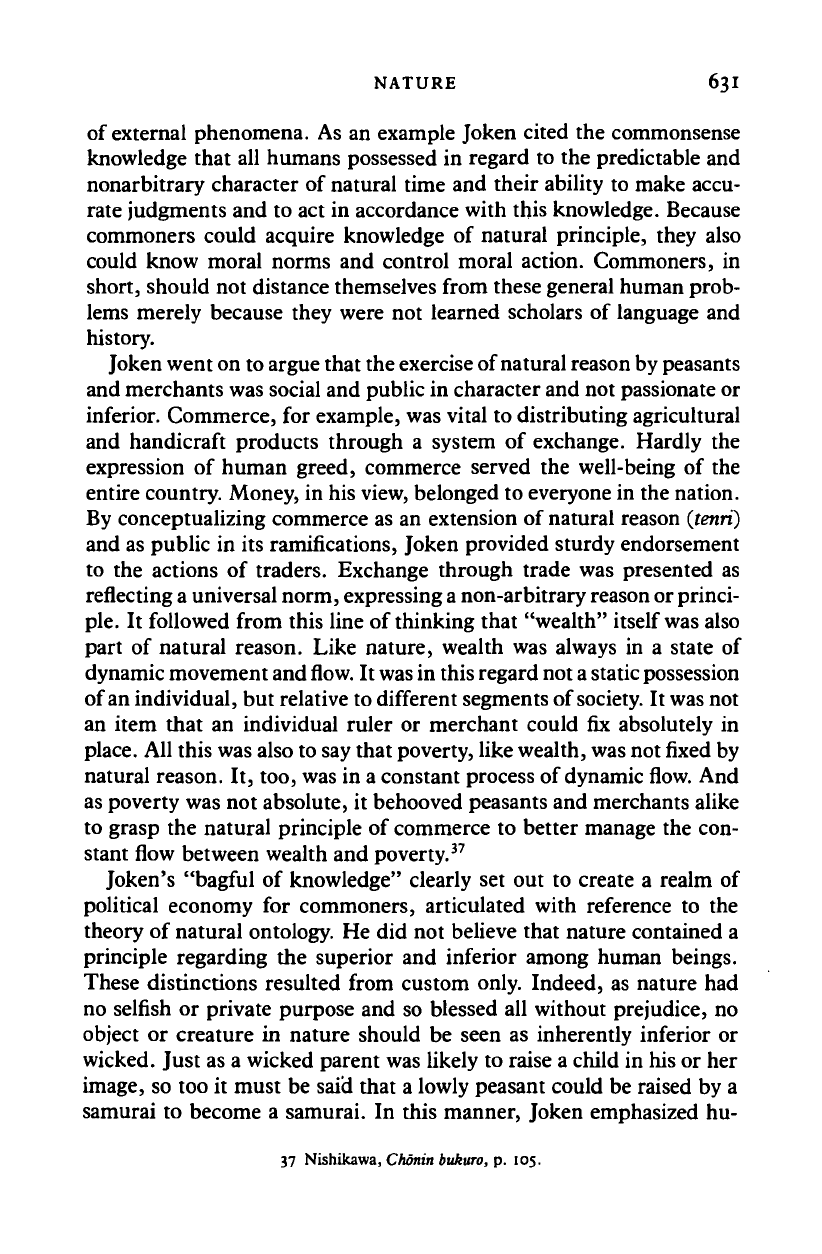
NATURE 631
of external phenomena. As an example Joken cited the commonsense
knowledge that all humans possessed in regard to the predictable and
nonarbitrary character of natural time and their ability to make accu-
rate judgments and to act in accordance with this knowledge. Because
commoners could acquire knowledge of natural principle, they also
could know moral norms and control moral action. Commoners, in
short, should not distance themselves from these general human prob-
lems merely because they were not learned scholars of language and
history.
Joken went on to argue that the exercise of natural reason by peasants
and merchants was social and public in character and not passionate or
inferior. Commerce, for example, was vital to distributing agricultural
and handicraft products through a system of exchange. Hardly the
expression of human greed, commerce served the well-being of the
entire country. Money, in his view, belonged to everyone in the nation.
By conceptualizing commerce as an extension of natural reason
(tenri)
and as public in its ramifications, Joken provided sturdy endorsement
to the actions of traders. Exchange through trade was presented as
reflecting
a
universal norm, expressing
a
non-arbitrary reason or princi-
ple.
It followed from this line of thinking that "wealth" itself
was
also
part of natural reason. Like nature, wealth was always in a state of
dynamic movement and
flow.
It
was
in this regard not
a static
possession
of an individual, but relative to different segments of society. It was not
an item that an individual ruler or merchant could fix absolutely in
place. All this was also to say that poverty, like wealth, was not
fixed
by
natural reason. It, too, was in a constant process of dynamic
flow.
And
as poverty was not absolute, it behooved peasants and merchants alike
to grasp the natural principle of commerce to better manage the con-
stant flow between wealth and poverty.
37
Joken's "bagful of knowledge" clearly set out to create a realm of
political economy for commoners, articulated with reference to the
theory of natural ontology. He did not believe that nature contained a
principle regarding the superior and inferior among human beings.
These distinctions resulted from custom only. Indeed, as nature had
no selfish or private purpose and so blessed all without prejudice, no
object or creature in nature should be seen as inherently inferior or
wicked. Just as a wicked parent was likely to raise a child in his or her
image, so too it must be said that a lowly peasant could be raised by a
samurai to become a samurai. In this manner, Joken emphasized hu-
37 Nishikawa, Chonin bukuro, p. 105.
Cambridge Histories Online © Cambridge University Press, 2008
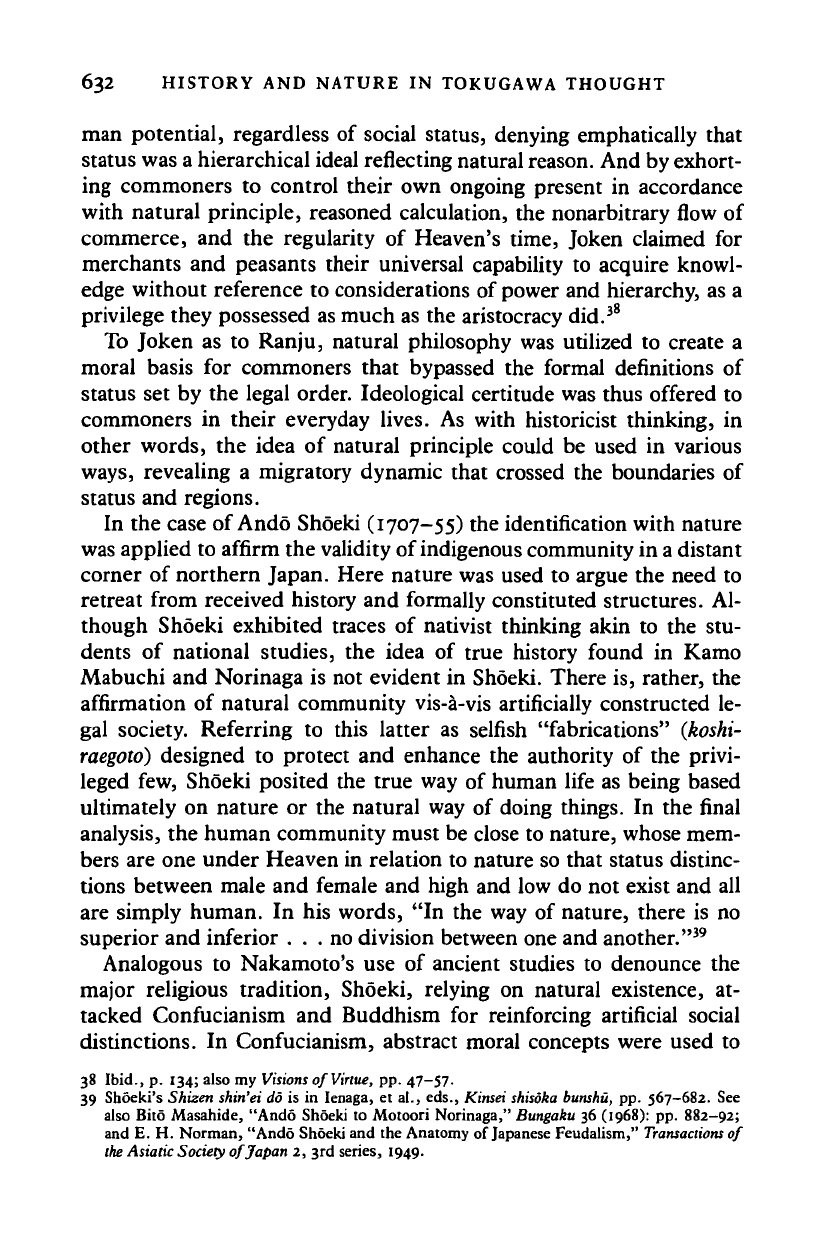
632 HISTORY AND NATURE IN TOKUGAWA THOUGHT
man potential, regardless of social status, denying emphatically that
status was a hierarchical ideal reflecting natural reason. And by exhort-
ing commoners to control their own ongoing present in accordance
with natural principle, reasoned calculation, the nonarbitrary flow of
commerce, and the regularity of Heaven's time, Joken claimed for
merchants and peasants their universal capability to acquire knowl-
edge without reference to considerations of power and hierarchy, as a
privilege they possessed as much as the aristocracy did.
38
To Joken as to Ranju, natural philosophy was utilized to create a
moral basis for commoners that bypassed the formal definitions of
status set by the legal order. Ideological certitude was thus offered to
commoners in their everyday lives. As with historicist thinking, in
other words, the idea of natural principle could be used in various
ways,
revealing a migratory dynamic that crossed the boundaries of
status and regions.
In the case of Ando Shoeki (1707-55) the identification with nature
was applied to affirm the validity of indigenous community in a distant
corner of northern Japan. Here nature was used to argue the need to
retreat from received history and formally constituted structures. Al-
though Shoeki exhibited traces of nativist thinking akin to the stu-
dents of national studies, the idea of true history found in Kamo
Mabuchi and Norinaga is not evident in Shoeki. There is, rather, the
affirmation of natural community vis-a-vis artificially constructed le-
gal society. Referring to this latter as selfish "fabrications" (koshi-
raegoto)
designed to protect and enhance the authority of the privi-
leged few, Shoeki posited the true way of human life as being based
ultimately on nature or the natural way of doing things. In the final
analysis, the human community must be close to nature, whose mem-
bers are one under Heaven in relation to nature so that status distinc-
tions between male and female and high and low do not exist and all
are simply human. In his words, "In the way of nature, there is no
superior and inferior ... no division between one and another."
39
Analogous to Nakamoto's use of ancient studies to denounce the
major religious tradition, Shoeki, relying on natural existence, at-
tacked Confucianism and Buddhism for reinforcing artificial social
distinctions. In Confucianism, abstract moral concepts were used to
38 Ibid., p. 134; also my
Visions
of
Virtue,
pp. 47-57.
39 Shoeki's Shizen shin'ei do is in Ienaga, et al., eds., Kinsei
shisoka
bunshu,
pp. 567-682. See
also Bito Masahide, "Ando Shoeki to Motoori Norinaga," Bungaku 36 (1968): pp. 882-92;
and E. H. Norman, "Ando Shoeki and the Anatomy of Japanese Feudalism,"
Transactions
of
the
Asiatic Society of Japan 2, 3rd series, 1949.
Cambridge Histories Online © Cambridge University Press, 2008
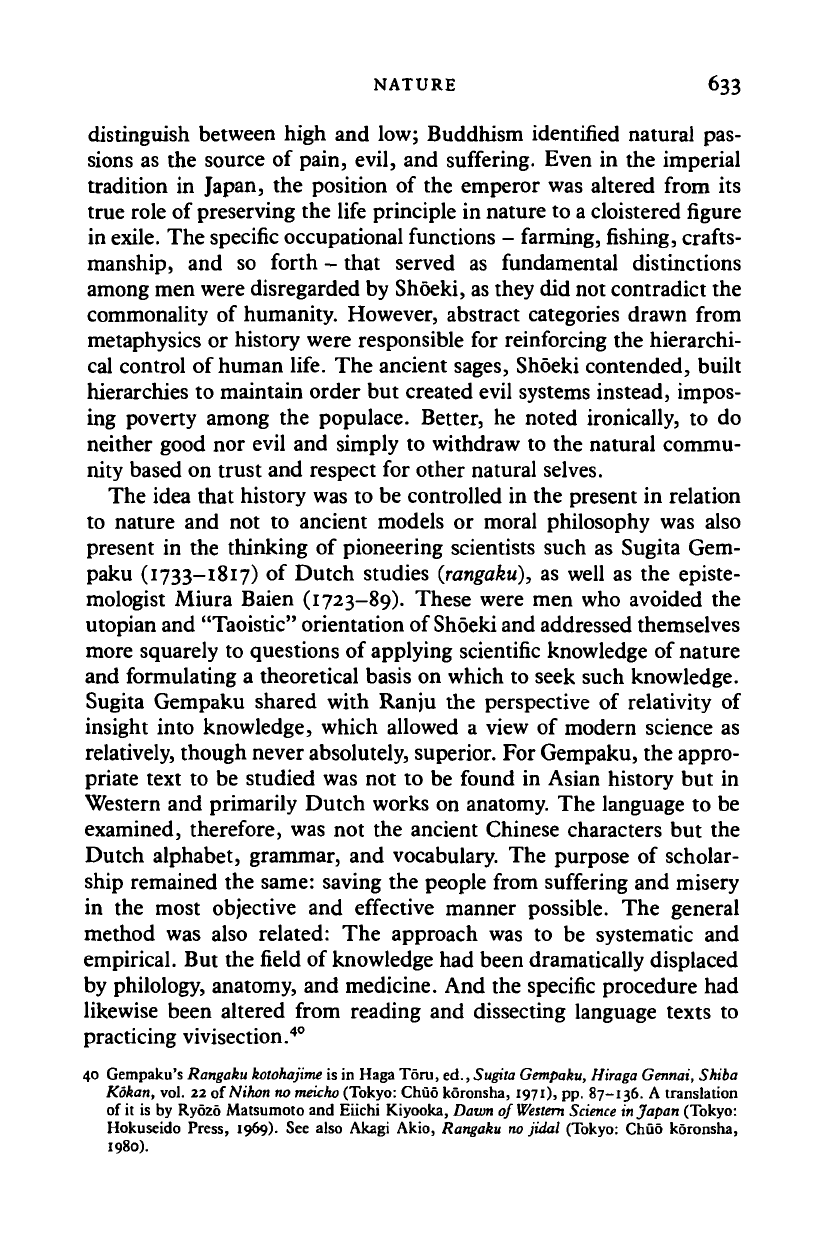
NATURE 633
distinguish between high and low; Buddhism identified natural pas-
sions as the source of pain, evil, and suffering. Even in the imperial
tradition in Japan, the position of the emperor was altered from its
true role of preserving the life principle in nature to a cloistered figure
in
exile.
The specific occupational functions - farming, fishing, crafts-
manship, and so forth - that served as fundamental distinctions
among men were disregarded by Shoeki, as they did not contradict the
commonality of humanity. However, abstract categories drawn from
metaphysics or history were responsible for reinforcing the hierarchi-
cal control of human life. The ancient sages, Shoeki contended, built
hierarchies to maintain order but created evil systems instead, impos-
ing poverty among the populace. Better, he noted ironically, to do
neither good nor evil and simply to withdraw to the natural commu-
nity based on trust and respect for other natural selves.
The idea that history was to be controlled in the present in relation
to nature and not to ancient models or moral philosophy was also
present in the thinking of pioneering scientists such as Sugita Gem-
paku (1733-1817) of Dutch studies
(rangaku),
as well as the episte-
mologist Miura Baien (1723-89). These were men who avoided the
Utopian and "Taoistic" orientation of Shoeki and addressed themselves
more squarely to questions of applying scientific knowledge of nature
and formulating a theoretical basis on which to seek such knowledge.
Sugita Gempaku shared with Ranju the perspective of relativity of
insight into knowledge, which allowed a view of modern science as
relatively, though never absolutely, superior. For Gempaku, the appro-
priate text to be studied was not to be found in Asian history but in
Western and primarily Dutch works on anatomy. The language to be
examined, therefore, was not the ancient Chinese characters but the
Dutch alphabet, grammar, and vocabulary. The purpose of scholar-
ship remained the same: saving the people from suffering and misery
in the most objective and effective manner possible. The general
method was also related: The approach was to be systematic and
empirical. But the field of knowledge had been dramatically displaced
by philology, anatomy, and medicine. And the specific procedure had
likewise been altered from reading and dissecting language texts to
practicing vivisection.
40
40 Gempaku's Rangaku kolohajime is in Haga Tom, ed., Sugita Gempaku, Hiraga Gennai, Shiba
Kokan, vol. 22 of Nihon no meicho (Tokyo: Chuo koronsha, 1971), pp. 87-136. A translation
of it is by Ryozo Matsumoto and Eiichi Kiyooka, Dawn of
Western
Science
in
Japan (Tokyo:
Hokuseido Press, 1969). See also Akagi Akio, Rangaku no jidal (Tokyo: Chuo koronsha,
1980).
Cambridge Histories Online © Cambridge University Press, 2008
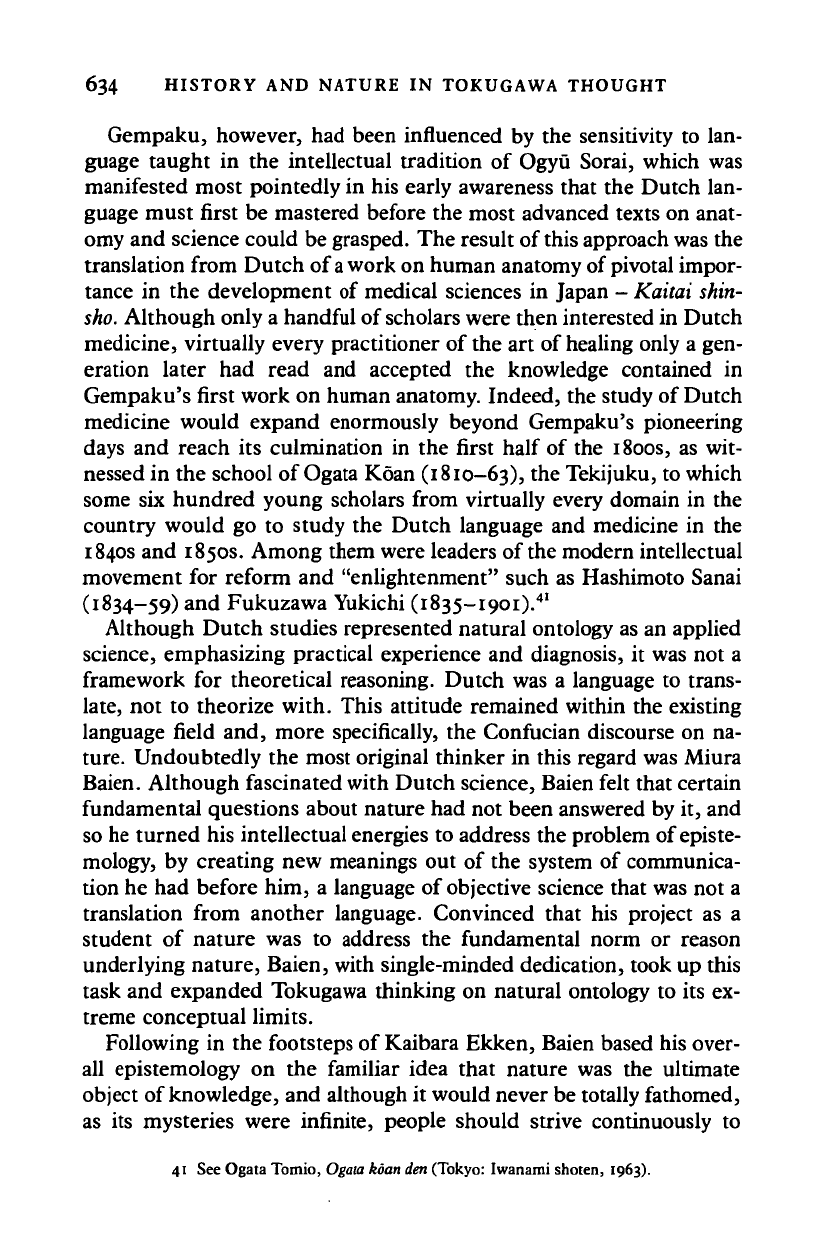
634 HISTORY AND NATURE IN TOKUGAWA THOUGHT
Gempaku, however, had been influenced by the sensitivity to lan-
guage taught in the intellectual tradition of Ogyu Sorai, which was
manifested most pointedly in his early awareness that the Dutch lan-
guage must first be mastered before the most advanced texts on anat-
omy and science could be grasped. The result of
this
approach was the
translation from Dutch of
a
work on human anatomy of pivotal impor-
tance in the development of medical sciences in Japan - Kaitai
shin-
sho.
Although only a handful of scholars were then interested in Dutch
medicine, virtually every practitioner of the art of healing only a gen-
eration later had read and accepted the knowledge contained in
Gempaku's first work on human anatomy. Indeed, the study of Dutch
medicine would expand enormously beyond Gempaku's pioneering
days and reach its culmination in the first half of the 1800s, as wit-
nessed in the school of Ogata Koan (1810-63), the Tekijuku, to which
some six hundred young scholars from virtually every domain in the
country would go to study the Dutch language and medicine in the
1840s and 1850s. Among them were leaders of the modern intellectual
movement for reform and "enlightenment" such as Hashimoto Sanai
(1834-59)
an
d Fukuzawa Yukichi (1835-1901).
41
Although Dutch studies represented natural ontology as an applied
science, emphasizing practical experience and diagnosis, it was not a
framework for theoretical reasoning. Dutch was a language to trans-
late,
not to theorize with. This attitude remained within the existing
language field and, more specifically, the Confucian discourse on na-
ture.
Undoubtedly the most original thinker in this regard was Miura
Baien. Although fascinated with Dutch science, Baien felt that certain
fundamental questions about nature had not been answered by it, and
so he turned his intellectual energies to address the problem of episte-
mology, by creating new meanings out of the system of communica-
tion he had before him, a language of objective science that was not a
translation from another language. Convinced that his project as a
student of nature was to address the fundamental norm or reason
underlying nature, Baien, with single-minded dedication, took up this
task and expanded Tokugawa thinking on natural ontology to its ex-
treme conceptual limits.
Following in the footsteps of Kaibara Ekken, Baien based his over-
all epistemology on the familiar idea that nature was the ultimate
object of knowledge, and although it would never be totally fathomed,
as its mysteries were infinite, people should strive continuously to
41 See Ogata Tomio, Ogata koan den (Tokyo: Iwanami shoten, 1963).
Cambridge Histories Online © Cambridge University Press, 2008
